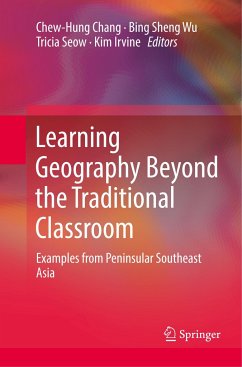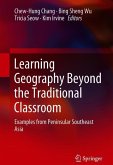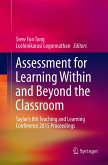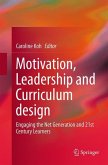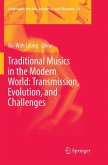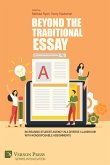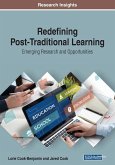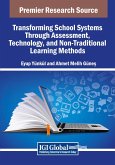Learning Geography Beyond the Traditional Classroom
Examples from Peninsular Southeast Asia
Herausgegeben:Chang, Chew-Hung; Wu, Bing Sheng; Seow, Tricia; Irvine, Kim
Learning Geography Beyond the Traditional Classroom
Examples from Peninsular Southeast Asia
Herausgegeben:Chang, Chew-Hung; Wu, Bing Sheng; Seow, Tricia; Irvine, Kim
- Broschiertes Buch
- Merkliste
- Auf die Merkliste
- Bewerten Bewerten
- Teilen
- Produkt teilen
- Produkterinnerung
- Produkterinnerung
This book provides a collection of critical pieces that support the idea that good teaching and learning of geography in fieldwork and using technology should consider the dimensions of curriculum design, instructional design and resource provision, as well as assessment for such learning activities. Further, it clearly describes the thinking, experiences and critical comments concerning two broad areas of learning outside the traditional classroom - in the field and with technology.
Andere Kunden interessierten sich auch für
![Learning Geography Beyond the Traditional Classroom Learning Geography Beyond the Traditional Classroom]() Learning Geography Beyond the Traditional Classroom77,99 €
Learning Geography Beyond the Traditional Classroom77,99 €![Assessment for Learning Within and Beyond the Classroom Assessment for Learning Within and Beyond the Classroom]() Assessment for Learning Within and Beyond the Classroom116,99 €
Assessment for Learning Within and Beyond the Classroom116,99 €![Motivation, Leadership and Curriculum Design Motivation, Leadership and Curriculum Design]() Motivation, Leadership and Curriculum Design77,99 €
Motivation, Leadership and Curriculum Design77,99 €![Traditional Musics in the Modern World: Transmission, Evolution, and Challenges Traditional Musics in the Modern World: Transmission, Evolution, and Challenges]() Traditional Musics in the Modern World: Transmission, Evolution, and Challenges85,99 €
Traditional Musics in the Modern World: Transmission, Evolution, and Challenges85,99 €![Beyond the Traditional Essay Beyond the Traditional Essay]() Beyond the Traditional Essay40,99 €
Beyond the Traditional Essay40,99 €![Redefining Post-Traditional Learning Redefining Post-Traditional Learning]() Lorie Cook-BenjaminRedefining Post-Traditional Learning126,99 €
Lorie Cook-BenjaminRedefining Post-Traditional Learning126,99 €![Transforming School Systems Through Assessment, Technology, and Non-Traditional Learning Methods Transforming School Systems Through Assessment, Technology, and Non-Traditional Learning Methods]() Transforming School Systems Through Assessment, Technology, and Non-Traditional Learning Methods174,99 €
Transforming School Systems Through Assessment, Technology, and Non-Traditional Learning Methods174,99 €-
-
-
This book provides a collection of critical pieces that support the idea that good teaching and learning of geography in fieldwork and using technology should consider the dimensions of curriculum design, instructional design and resource provision, as well as assessment for such learning activities. Further, it clearly describes the thinking, experiences and critical comments concerning two broad areas of learning outside the traditional classroom - in the field and with technology.
Produktdetails
- Produktdetails
- Verlag: Springer / Springer Nature Singapore / Springer, Berlin
- Artikelnr. des Verlages: 978-981-13-4219-6
- Softcover reprint of the original 1st edition 2018
- Seitenzahl: 224
- Erscheinungstermin: 16. Dezember 2018
- Englisch
- Abmessung: 235mm x 155mm x 13mm
- Gewicht: 349g
- ISBN-13: 9789811342196
- ISBN-10: 9811342199
- Artikelnr.: 57008167
- Herstellerkennzeichnung Die Herstellerinformationen sind derzeit nicht verfügbar.
- Verlag: Springer / Springer Nature Singapore / Springer, Berlin
- Artikelnr. des Verlages: 978-981-13-4219-6
- Softcover reprint of the original 1st edition 2018
- Seitenzahl: 224
- Erscheinungstermin: 16. Dezember 2018
- Englisch
- Abmessung: 235mm x 155mm x 13mm
- Gewicht: 349g
- ISBN-13: 9789811342196
- ISBN-10: 9811342199
- Artikelnr.: 57008167
- Herstellerkennzeichnung Die Herstellerinformationen sind derzeit nicht verfügbar.
Dr. Chang Chew-Hung is an associate professor in the Humanities and Social Studies Education Academic Group and also Associate Dean of the Office of Graduate Studies and Professional Learning, National Institute of Education, Nanyang Technological University, Singapore. Dr. WU Bing Sheng is an assistant professor at the National Taiwan Normal University, Taipei, Taiwan. His research interests are GIS, remote sensing, urban modeling, volunteered geographical information, and spatial learning. Dr. Tricia SEOW is lecturer at the National Institute of Education, Nanyang Technological University, Singapore. She graduated from the Institute of Education, London in 2014. Dr. Kim Irvine is an associate professor at the National Institute of Education, Nanyang Technological University, Singapore. He has published 100 peer-reviewed articles and book chapters, primarily related to water-resource management and water-quality issues.
1 The where and how of learning Geography beyond the classroom.- 2 Learning in the field: A conceptual approach to field-based learning in Geography.- 3 Teaching geography with technology: A critical commentary.- 4 Assessing how Geography is learnt beyond the classroom.- 5 What happened to the textbook example of the Padang Benggali groyne field in Butterworth, Penang?.- 6 The River Guardian Program for Junior High Schools on the "River of Kings", Thailand.- 7 Paradigm Shift in Humanities Learning Journey.- 8 Authentic Learning: making sense of the real environment using mobile technology tool.- 9 Location-aware, context-rich field data recording, using mobile devices for field-based learning in Geography.- 10 High-speed Mobile Telecommunication Technology in the Geography Classroom.- 11 Social Media: A Space to Learn.- 12 School leadership and teachers' comfort level in using Information and Communications Technology (ICT) to enhance geographical learning: The case of lower secondarygeography in Singapore.- 13 Reflecting on field-based and technology enabled learning in Geography.
1 The where and how of learning Geography beyond the classroom.- 2 Learning in the field: A conceptual approach to field-based learning in Geography.- 3 Teaching geography with technology: A critical commentary.- 4 Assessing how Geography is learnt beyond the classroom.- 5 What happened to the textbook example of the Padang Benggali groyne field in Butterworth, Penang?.- 6 The River Guardian Program for Junior High Schools on the "River of Kings", Thailand.- 7 Paradigm Shift in Humanities Learning Journey.- 8 Authentic Learning: making sense of the real environment using mobile technology tool.- 9 Location-aware, context-rich field data recording, using mobile devices for field-based learning in Geography.- 10 High-speed Mobile Telecommunication Technology in the Geography Classroom.- 11 Social Media: A Space to Learn.- 12 School leadership and teachers' comfort level in using Information and Communications Technology (ICT) to enhance geographical learning: The case of lower secondarygeography in Singapore.- 13 Reflecting on field-based and technology enabled learning in Geography.

